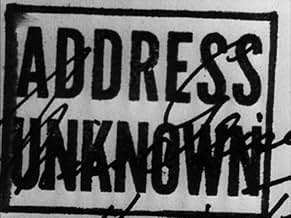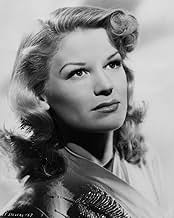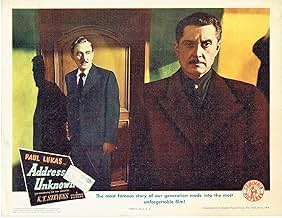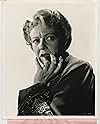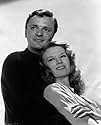Ajouter une intrigue dans votre langueA U.S.-based art dealer travels to his former homeland of Germany, where he becomes dangerously susceptible to Nazi propaganda.A U.S.-based art dealer travels to his former homeland of Germany, where he becomes dangerously susceptible to Nazi propaganda.A U.S.-based art dealer travels to his former homeland of Germany, where he becomes dangerously susceptible to Nazi propaganda.
- Réalisation
- Scénario
- Casting principal
- Nommé pour 2 Oscars
- 1 victoire et 2 nominations au total
- Youngest Schulz Boy
- (as Larry Joe Olsen)
- Rock-Tossing Rioter
- (non crédité)
- Nazi Party Member
- (non crédité)
Avis à la une
The story concerns two German art dealers in San Francisco circa 1932, Martin (Lukas) and Max Eisenstein (Carnovsky). It falls to Martin to return to Germany with his family to buy and ship art work back to the U.S. gallery. With him and the family is also Griselle, Martin's son's (van Eyck) fiancée, who has acting aspirations and wants to work overseas.
Martin becomes seduced by the "new Germany" under Hitler and becomes friends with a baron (Carl Esmond) who encourages him to break ties with his Jewish partner, which he does. The baron also learns that Griselle, who uses the last name Stone, is Jewish. Griselle has a part in a play, and the Nazis have forbidden certain lines to be spoken from the Beatitudes. Griselle says them anyway, and, outed as a Jew by someone at the performance, she runs for her life. She makes her way to Martin's place, where she is turned away.
Martin starts to receive letters from Max that are written in obvious code, giving dimensions of Picassos and having certain numbers substituted for numbers previously sent. The baron warns him that sending and receiving codes is illegal. Martin denies that he is receiving coded letters, meanwhile begging Max to stop writing to him.
The film is very well done in a film noir style, and you can't go wrong visually with Menzies and with Rudy Mate on the camera. The shadows and camera angles are striking, particularly in the play scene and when Martin is alone in his house toward the end of the film. Well worth seeing for the art direction and cinematography alone.
In the actual story, Martin and Griselle have had an affair previously, and Griselle is actually Max's sister. The joke painting that Martin sends back to San Francisco that Max tries to hide from a customer is actually a Picasso - I'm not sure that was made clear in the film.
The action in this film, Martin's turning etc., take place seemingly very quickly and don't come off as believably as in the book, which is actually a series of letters. It has been republished, translated into many languages, and also turned into a play and adapted for radio; it was considered very important at the time it was published, so important that it was felt "too strong" to have been written by a woman, so Katherine Taylor used her maiden name instead to get Kressman Taylor.
The ending pf the film is unexpected. Very suspenseful and absorbing and amazing to look at - with a wonderful performance by Paul Lukas and the rest of the cast - Address Unknown is highly recommended.
The film begins in the 1930s. Paul Lukas and his wife and kids (minus the oldest one) are leaving the US and moving back to Germany. They also decide to take their god-daughter (who is Jewish). Once there, Lukas slowly turns from a nice family man to a Nazi-lover. In the process, all sense of right and wrong seems to disappear from him. And, when his beloved god-daughter is in trouble, he refuses to help. At this point, there is a neat twist in the film involving coded messages and revenge. I won't say more, as it would spoil the film. Suffice to say that this twist gives the film a nice and fitting ending.
The acting, mood and story are all quite good and the film worth seeing. While not a great film it is clever and well-written--and a very good propaganda film to galvanize the folks at home in the war effort.
I feel that the opening scenes are very good and authentically display the friendship between Max and Martin and their families and this of course makes the story all the more powerful.
I have read the short story/book on which the film is based - it is available to borrow from the Internet Archive on line free library - and in my opinion this one if the rare occasions when the film is better than the book, largely due to the devastating end twist in the film.
The story develops through letter correspondence between the two friends, Martin and Max. There are several stand out scenes, my favourites being the performance at the theatre when Griselle disobeys the Nazi authorities and the following chase that ensues in order to catch her. The acting is good, particularly from Carl Esmond. You just know that there is a nasty ulterior motive lurking behind everything that he says and does. Once Martin begins to receive coded letters, suspicion is aroused by the German censors and it's a matter of time before something happens to him... There is a twist at the end.
Le saviez-vous
- AnecdotesK.T. Stevens (real name: Gloria Wood) is the daughter of the film's producer, Sam Wood.
- GaffesWhen Griselle first puts her bloody hand on the frame of Schulz's entrance door after he opens up, the right hand is placed at a certain height and angle while the fingers are spread in a certain shape. But in the following cuts, the hand and fingers have constantly changed angles and positions. In addition, the shape of the bloody hand-print left on the door frame after Schulz closes the door does not match the shape and location Griselle originally placed her hand.
- Citations
Baron von Friesche: Does he know the conditions he doesn't like? I find that hard to understand. I myself would hesitate to form conclusions without firsthand evidence. You must set him right. I suppose it isn't easy for a foreigner to understand the agonies our people have suffered since the Treaty of Versailles. What years of less and less bread, of leaner bodies, of the end of hope...
[pauses to offer Herr Schulz a cigarette]
Martin Schulz: [accepting a cigarette] Oh, thank you.
Baron von Friesche: The quicksand of despair held us. Then just before we died, a man came and pulled us out.
Baron von Friesche: [turning to Herr Professor] You are a native of Munich, Herr Professor?
Professor Schmidt: Well, uh...
Baron von Friesche: You have *witnessed* this deliverance.
Professor Schmidt: If it *is* a deliverance...
Baron von Friesche: [turning to Herr Schulz] You know, there's a surge, my friend. A surge. Our whole despair has been thrown aside like a forgotten coat. No longer do we wrap ourselves in shame.
Baron von Friesche: [turning to Herr Professor] What can be wrong about a man who affects people so?
Professor Schmidt: When people are hungry, they don't care *what* kind of a man it is who gives them bread.
- Crédits fousThe final fade-out is a closeup of the returned letter, specifically the "Address Unknown" stamped in English. It forms an end title card, which was itself unusual for its time.
Meilleurs choix
Détails
- Durée1 heure 15 minutes
- Couleur
- Rapport de forme
- 1.37 : 1
Contribuer à cette page



